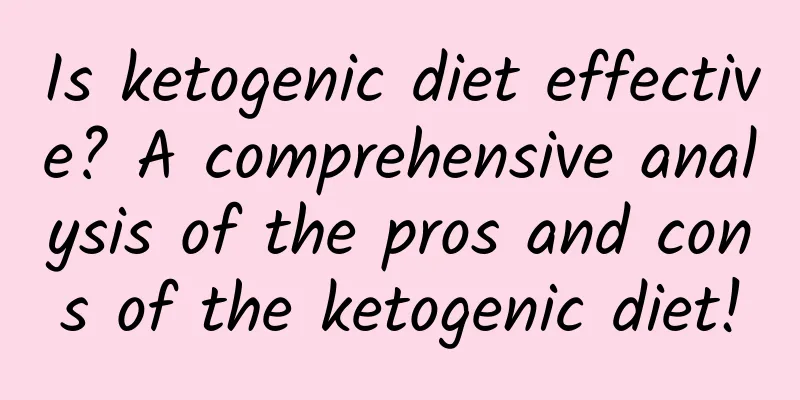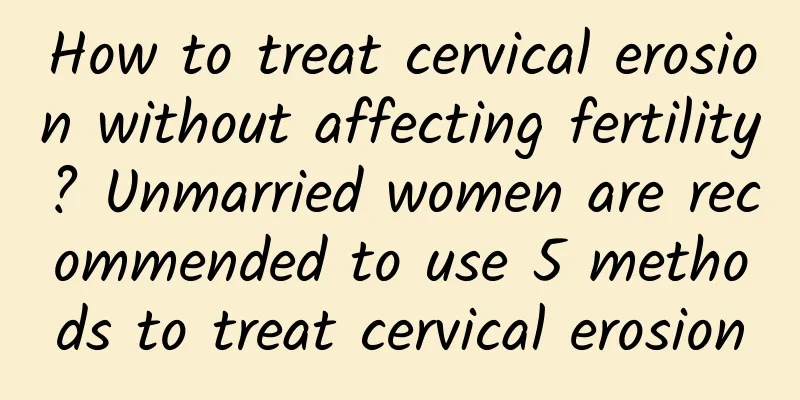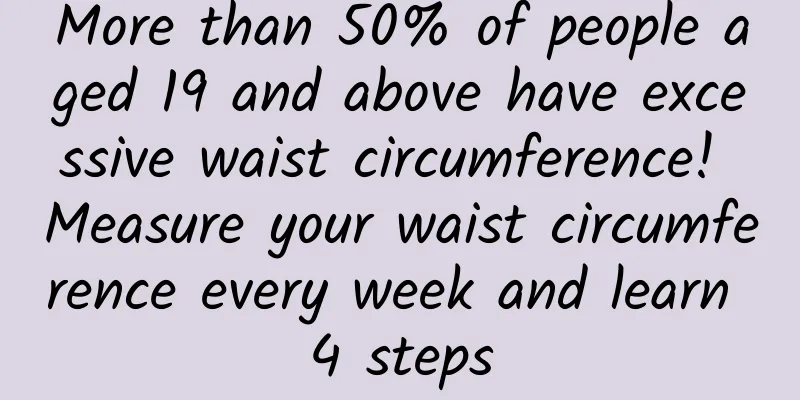Is ketogenic diet effective? A comprehensive analysis of the pros and cons of the ketogenic diet!

|
A year ago, I gave a corporate speech on the topic of "Analysis of the Pros and Cons of the Ketogenic Diet". Of course, the content explained both the positive and negative sides. After all, the topic is a pros and cons analysis! The ketogenic diet was very popular at the time. After the speech, I received feedback from a "keto supporter". He believed that he was following the ketogenic diet and did not have any side effects or physical discomfort. The same was true for his other "keto-friendly people". Indeed, this is how the eating pattern is. Some people are very suitable for it, while others just can't adapt to it no matter what. Therefore, this article is not to argue whether the ketogenic diet is good or bad, but to analyze the ketogenic diet from a scientific perspective. After all, many things have two sides, and there are pros and cons. After all, what exactly is the ketogenic diet, which has quickly become popular in recent years and is loved by many artists and celebrities? Why do people say it is very effective for weight loss? Let’s keep watching. What is the Ketogenic Diet? Different from a balanced diet, the ketogenic diet is a high-fat, very low-sugar diet, in which fat accounts for about 75% of the total calories, sugars are reduced to 5%, and the remaining calories are supplied by protein. When the human body is on a "very low carbohydrate" diet, it cannot use glucose as a source of energy, so it breaks down fat in large quantities. However, since it cannot be completely oxidized, the metabolic pathway of fatty acids shifts to ketone body production . In addition to being used by body tissues, ketone bodies can also serve as a source of energy for the brain. (Brain tissue basically uses glucose, but when the concentration of ketone bodies accumulates in the blood, the brain tissue will also begin to use ketone bodies.) Modern medicine also uses the characteristics of ketone bodies to slow down abnormal brain discharges and applies the ketogenic diet to the treatment of childhood epilepsy . In recent years, many studies have found that the ketogenic diet has positive effects on controlling blood sugar and reducing weight, causing a sensation and popularity. Can the ketogenic diet help you lose weight? Why? Studies on the weight control of healthy people in the short term (8 to 12 weeks) have found that the ketogenic diet can indeed reduce body weight and body mass index (BMI) because: 1. The ketogenic diet produces a feeling of fullness and reduces appetite. 2. The ketogenic diet reduces fat synthesis (lipogenesis) and increases fat breakdown (lipolysis). 3. A ketogenic diet consumes more energy. For an adult who needs to consume 1600kcal a day, the ketogenic diet requires 10 servings more fat a day, and medium-fat meat and high-fat meat total 11 servings. Fats take the longest time to digest of all food categories, followed by meat and other proteins. Such a large amount of fat and meat can slow down the rate of gastric emptying, help prolong the feeling of fullness, and reduce the desire to eat. In addition, protein foods such as meat have a high thermogenic effect and will also increase calorie consumption during the digestion and absorption process. In addition, in an extremely low sugar state, the human body can hardly obtain blood sugar directly from the diet and needs to rely on gluconeogenesis to produce it, which requires more energy to work. As for other energy, it depends on the decomposition of fat to produce fatty acids or ketone bodies to maintain it. Therefore, the fat in the body will be decomposed and burned as an energy source to produce ketone bodies (ketone), achieving a fat-reducing effect. A strict ketogenic diet is not that easy! Perhaps many people will think that the ketogenic diet is great when they see this. You can eat a lot of meat, use a lot of oil, and still lose weight! In fact, it is not that easy to lose weight by following the ketogenic diet. First, ketogenic diet does not mean unlimited eating. If you want to lose weight, you still have to control the total calories . Second, you have to ensure the quality and quantity of the oil. If you eat out, how do you know how much oil the store has added? Is the oil of good quality or bad quality? Many people think that the ketogenic diet allows them to indulge in fried chicken and deep-fried chicken at fast food restaurants. In fact, consuming too much low-quality oil will cause free radicals and toxins in the body, and may also cause cardiovascular problems. Third, you may go crazy looking for food during mealtimes. It is difficult to find takeout that complies with the ketogenic diet in Taiwan. Common bento, fried rice, dumplings, hamburgers, sandwiches... all do not meet the requirements. If you want to strictly follow the ketogenic diet, it is best to prepare your own meals every day, which is safer. Moreover, the ketogenic diet is not 100% safe. Ketone bodies still need insulin to metabolize. Patients who are congenitally unable to secrete insulin or have relatively insufficient insulin have a high risk of ketoacidosis. Therefore, it is very dangerous for patients with type 1 diabetes who are unable to secrete insulin, type 2 diabetes who have relatively insufficient insulin, or even those in the prediabetes stage to rashly implement a ketogenic diet. Even for healthy people, there are still many health risks. Being in a high-fat, low-carbohydrate ketogenic mode for a long time is likely to cause inflammation, dyslipidemia, fatty liver, glucose intolerance, etc. A diet high in saturated fatty acids such as coconut oil, cream, and butter will increase low-density lipoprotein cholesterol and the risk of cardiovascular diseases such as atherosclerosis, myocardial infarction, and stroke. A high-fat diet has also been shown to increase the risk of breast cancer. At the same time, a long-term and significant reduction in whole grains, vegetables, and fruits will reduce the intake of dietary fiber, phytochemicals, vitamin B1, folic acid, vitamin C, iron, and magnesium, and may also cause nutrient deficiencies, constipation, metabolic abnormalities, and other problems. The ketogenic diet has its pros and cons. Just like many things in life, once you choose it, there are certain risks! I think the ketogenic diet is not completely unfeasible, but the length of implementation and whether there is medical supervision become very critical factors. People who generally want to lose weight can try to think about what the purpose of losing weight is? Is it to improve your health, change your body shape, make yourself happier and more confident, or will losing weight create more physical problems? There are many ways to lose weight, but is it necessary to eat ketogenic diet? It is worth thinking about it. After all, eating patterns are dead, but people are alive. We should not be controlled or bound by food. We should try to find the eating method that makes us most comfortable and happy, so that we can implement it in the long run. References Obesity Research Society of the Republic of China (Data compiled by Director Su Xiuyue) Skin Pharmacol Physiol. 2012;25(3):111-7. doi: 10.1159/000336404. Epub 2012 Feb 11. Nutrition and acne: therapeutic potential of ketogenic diets. Paoli A1, Grimaldi K, Toniolo L, Canato M, Bianco A, Fratter A. www.medpartner.club/low-carbonhydrate-ketogenic-diet-myth/ The content comes from the blog of nutritionist Sun Yuming, who loves to talk For more details, please see Nutritionist Loves to Talk - Sun Yuming Nutritionist Blog |
>>: Correct turtle neck! Exercise your waist and back curves with your ballet teacher
Recommend
What are the treatments for the most common types of uterine fibroids?
Among the many gynecological diseases, everyone s...
Early treatment costs for cervical precancerous lesions
Nowadays, many friends suffering from cervical pr...
Is B-ultrasound accurate in detecting pelvic effusion? What are the precautions?
Pelvic effusion is a common phenomenon. Many wome...
Improve weight loss results! Drink vegetable and fruit puree for breakfast and dinner
The secret to losing weight by drinking vegetable...
Is cervical hypertrophy cervicitis?
Cervical hypertrophy may be a manifestation of ce...
Get your butt off the chair! 8 ways to do light exercise to prevent obesity and stroke
How long have you been sitting in the chair? If i...
Several misunderstandings about uterine fibroids that need attention
In real life, there are some misunderstandings ab...
Drink porridge to nourish your stomach in winter! Millet and sweet potatoes increase satiety without causing fat
Drinking porridge in winter not only nourishes th...
There are 8 ways to lose weight without asking for help and increase your basal metabolic rate
8 Ways to Increase Your Basal Metabolic Rate Tip ...
Endometrial polyps grow fast, what's going on?
The rapid growth of endometrial polyps may be cau...
What supplements can my wife take for uterine fibroids? What are the best foods for patients with uterine fibroids?
My wife's uterine fibroids are a common gynec...
What should adolescent girls eat to regulate their bodies for dysmenorrhea
Dysmenorrhea in adolescent girls can be relieved ...
How to effectively treat vulvar leukoplakia?
There are many treatments for vulvar leukoplakia....
How many of these five behaviors that harm your uterus do you encounter? Come and have a look!
External maintenance is a course that fairies lea...
What happens if ovarian cysts cause amenorrhea?
What happens if ovarian cysts cause amenorrhea? O...









